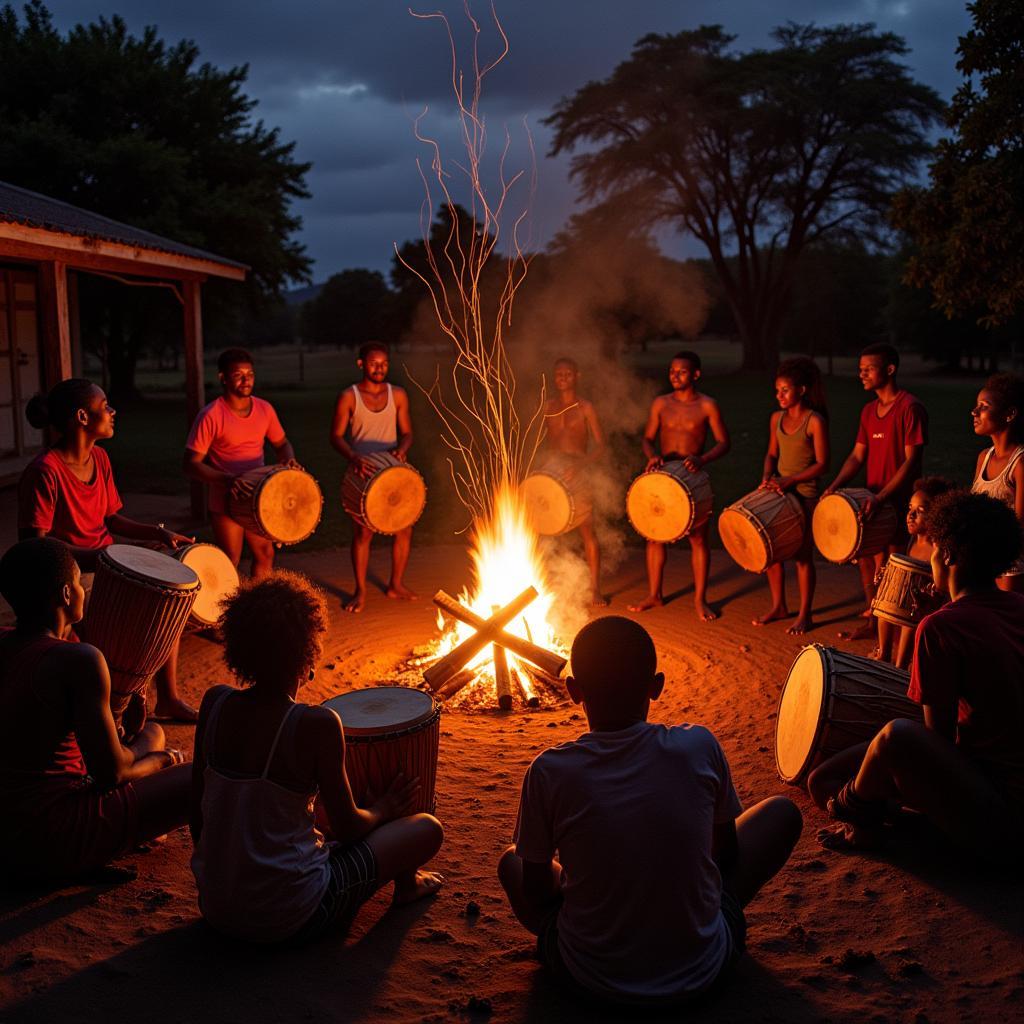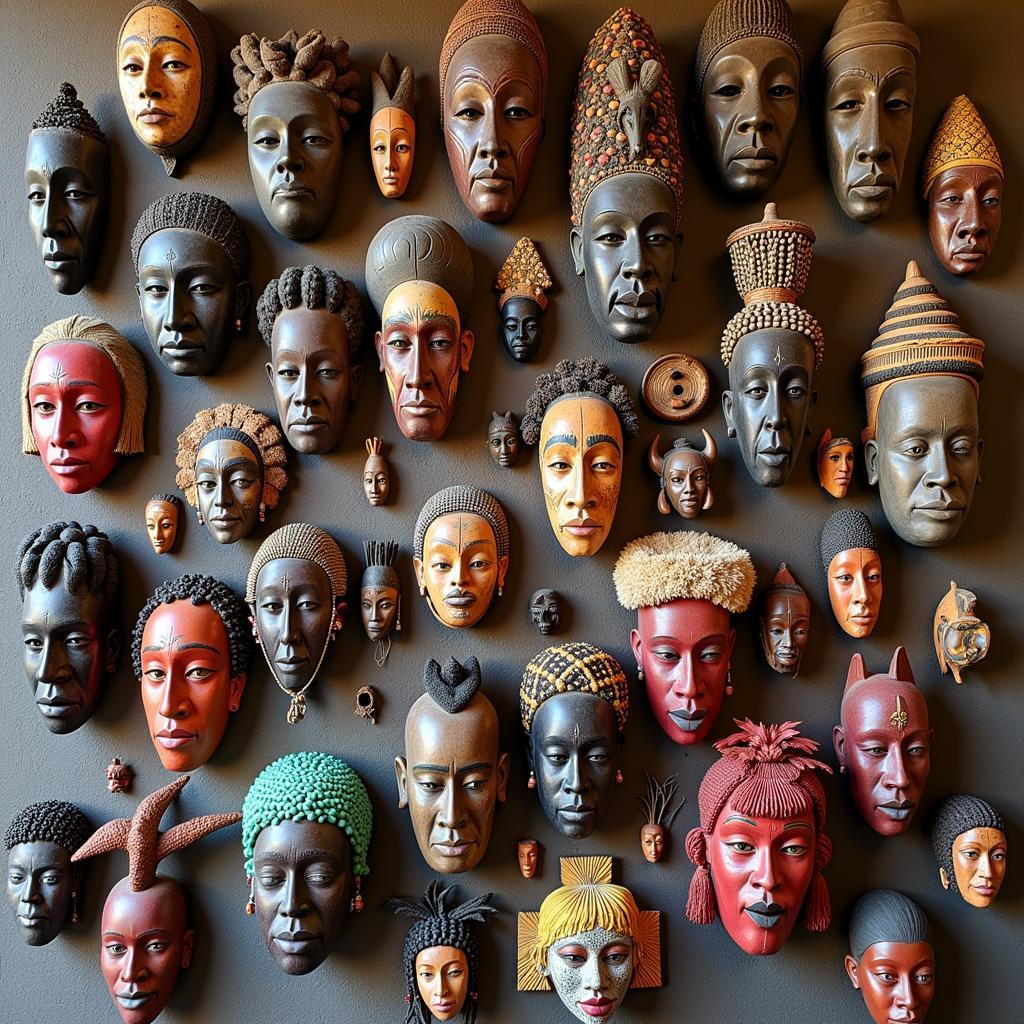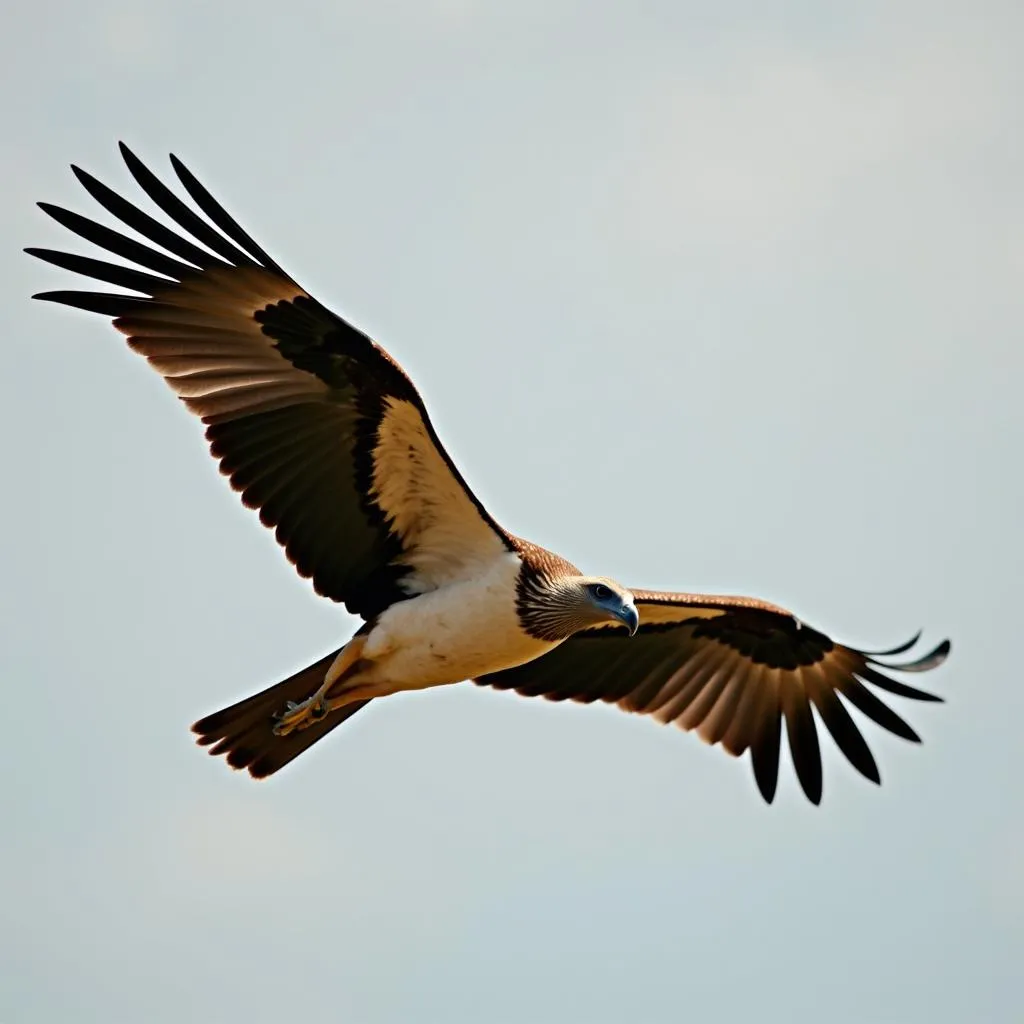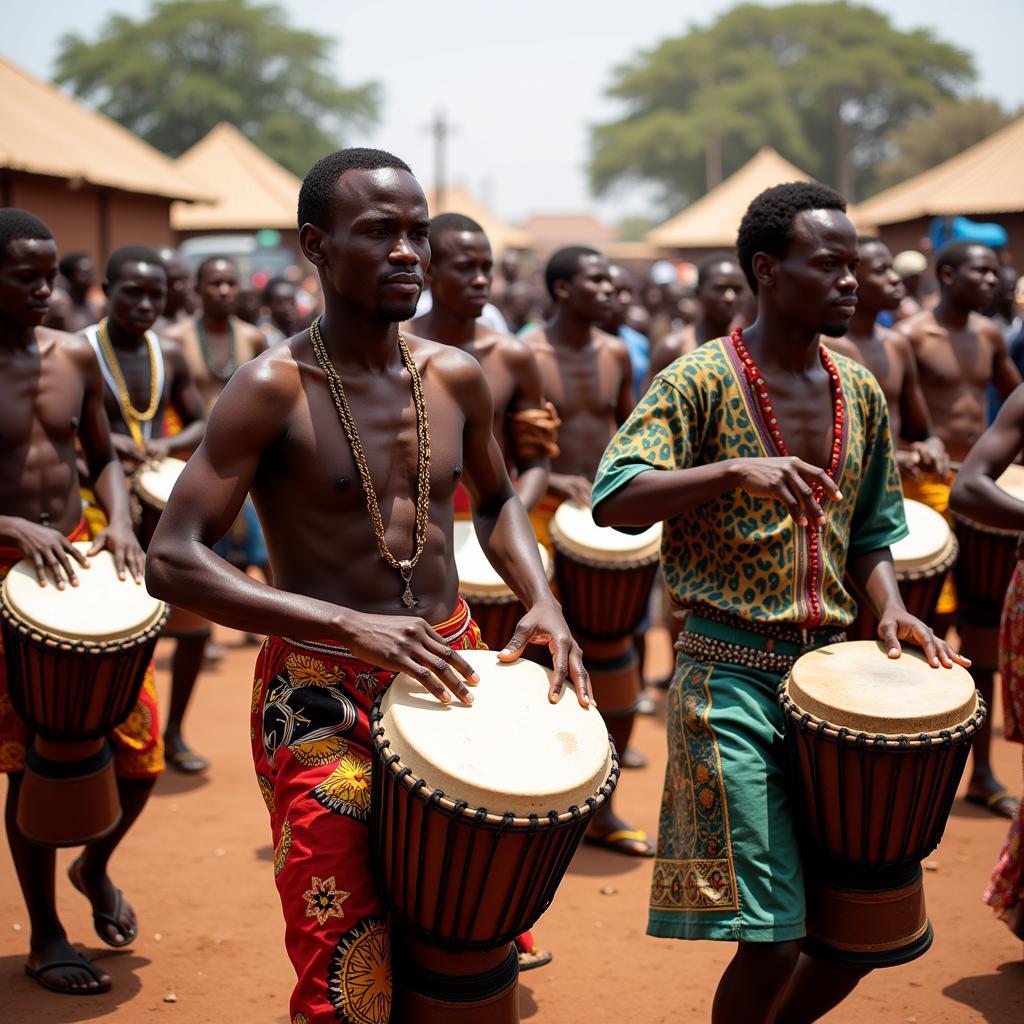The Endearing Bond: An African Elephant with Calf
The sight of an African Elephant With Calf is one of nature’s most touching spectacles. This gentle giant, known for its immense size and power, displays an incredible tenderness and devotion to its young. The bond between mother and calf is fundamental to the survival of these magnificent creatures, shaping the calf’s development and ensuring the continuation of the species. Let’s delve deeper into this fascinating relationship.
Understanding the African Elephant Family Dynamic
African elephants, both the savanna and forest varieties, live in complex matriarchal societies. The oldest and most experienced female, the matriarch, leads the herd, guiding them to food and water sources and protecting them from danger. Within this structure, the mother-calf bond forms the core unit. Calves rely entirely on their mothers for the first few years of their lives, learning essential survival skills and social etiquette through observation and imitation. The entire herd participates in raising the young, creating a supportive and nurturing environment. This communal upbringing strengthens the family unit and contributes to the overall well-being of the herd. 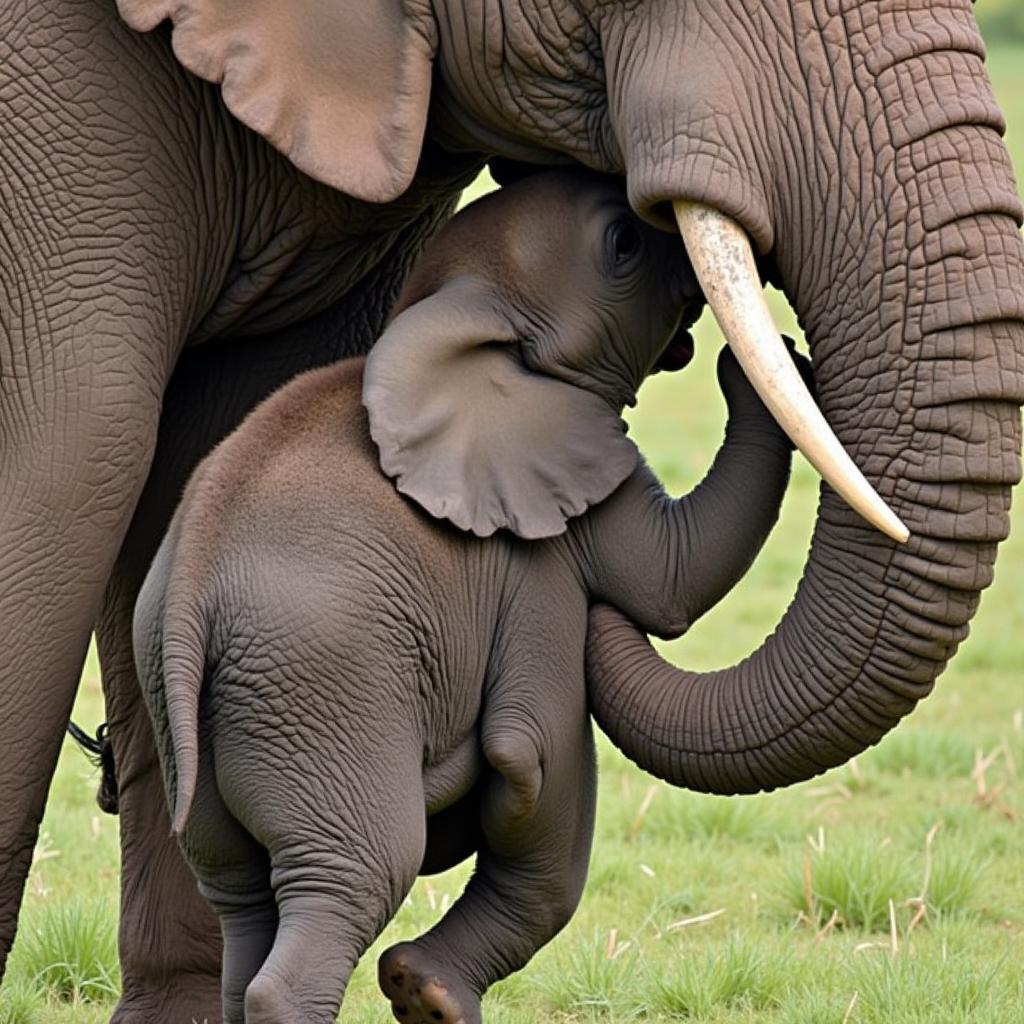 African Elephant Calf Nursing
African Elephant Calf Nursing
The Crucial First Years: A Journey of Growth and Learning
An African elephant calf’s early life is a period of intense learning and development. From the moment they are born, weighing over 200 pounds, calves are immediately integrated into the herd. They quickly learn to walk, usually within a few hours, and begin to explore their surroundings under the watchful eyes of their mother and other herd members. The calf’s dependence on its mother for milk is absolute, providing crucial nutrients for growth and immunity. african elephant calf are often seen playfully interacting with other calves, developing crucial social skills that will serve them throughout their lives. This period of playful interaction is not just for entertainment, but essential for learning how to navigate the complexities of elephant society.
Navigating the Wild: Lessons from the Matriarch and Herd
As the calf grows, it gradually becomes more independent, exploring further from its mother’s side but always staying within the protective embrace of the herd. The matriarch plays a vital role in educating the calf, imparting her wisdom and experience to the younger generation. The matriarch teaches the calf everything from locating food and water to recognizing and avoiding predators. The herd acts as a collective babysitter, providing protection and guidance. This communal upbringing ensures the calf’s survival and prepares it for the challenges of adulthood.
Threats to African Elephants and Their Calves
Sadly, African elephants face numerous threats, primarily from poaching and habitat loss. The demand for ivory continues to fuel illegal hunting, devastating elephant populations. Habitat fragmentation due to human encroachment forces elephants into smaller areas, increasing competition for resources and making them more vulnerable to conflict with humans. These pressures have a significant impact on calf survival rates, threatening the future of these magnificent animals. african bush elephant female are particularly targeted by poachers, which devastates family units and leaves calves orphaned.
What is the typical weight of an African elephant calf at birth?
An African elephant calf typically weighs between 200-300 pounds at birth.
How long does an African elephant calf stay with its mother?
African elephant calves stay with their mothers for several years, sometimes up to a decade or more.
What are the main threats to African elephant calves?
Poaching, habitat loss, and human conflict are the main threats.
Conservation Efforts: Protecting the Future of African Elephants
Numerous organizations are working tirelessly to protect African elephants and their calves. These efforts include anti-poaching patrols, community engagement programs, and habitat conservation initiatives. african elephant vs indian elephant weight is a popular search term, highlighting the interest in these magnificent animals. Supporting these organizations is crucial to ensuring the survival of these iconic creatures for future generations. african elephants tattoo on ankles are becoming a popular way for people to express their admiration for these creatures. However, true conservation requires more than just symbolic gestures. We must actively support initiatives that protect elephants in their natural habitats.
Conclusion: The Future of the Gentle Giants
Witnessing an African elephant with calf is a reminder of the intricate beauty and fragility of the natural world. Protecting these magnificent creatures and their young is not just a conservation issue; it’s a moral imperative. By supporting conservation efforts and raising awareness, we can help ensure that future generations have the opportunity to witness the endearing bond between an African elephant and its calf. african jungle animals attack highlights the dangers faced by wildlife, further emphasizing the importance of conservation.
FAQ
- How long do African elephants live? African elephants can live for up to 70 years in the wild.
- What do African elephants eat? African elephants are herbivores, consuming grasses, leaves, bark, and fruits.
- How can I help protect African elephants? Support reputable conservation organizations, advocate for stronger anti-poaching laws, and spread awareness about the importance of elephant conservation.
- Are African elephants endangered? African elephants are listed as vulnerable and endangered, depending on the species.
- How intelligent are African elephants? African elephants are highly intelligent animals, demonstrating complex social behaviors, problem-solving skills, and even signs of grief.
- How big are African elephants? African elephants are the largest land animals on Earth, with males reaching up to 13 feet tall and weighing over 6 tons.
- How much water do African elephants drink per day? African elephants can drink up to 50 gallons of water per day.
When needing assistance, please contact us at Phone Number: +255768904061, Email: [email protected], or visit our address: Mbarali DC Mawindi, Kangaga, Tanzania. We have a 24/7 customer service team.
